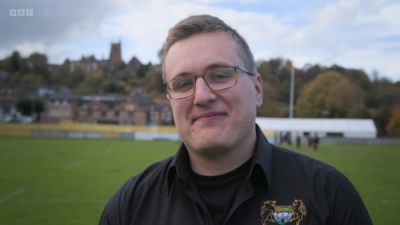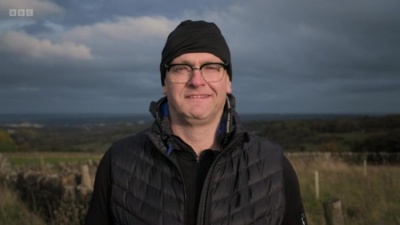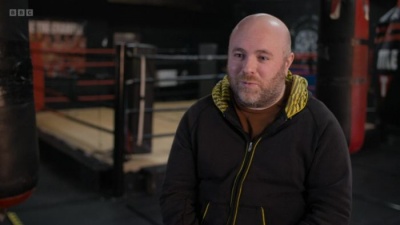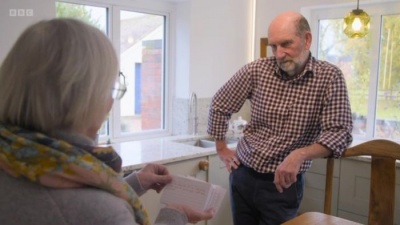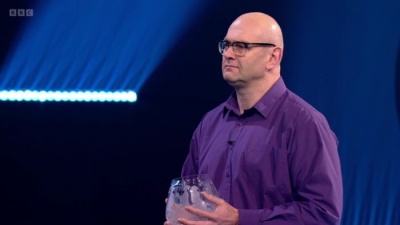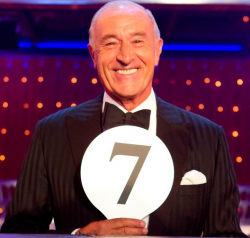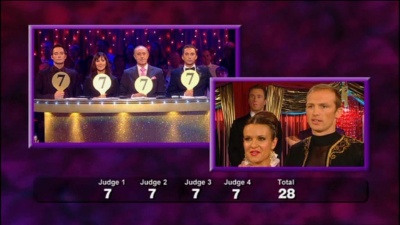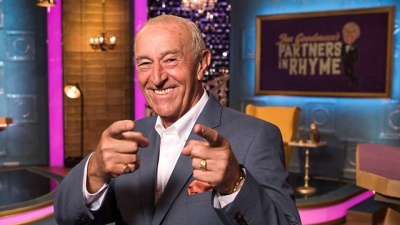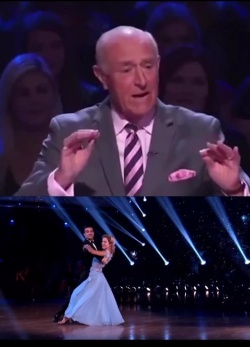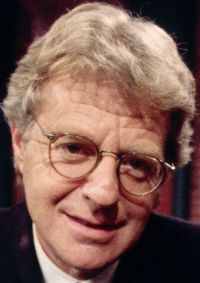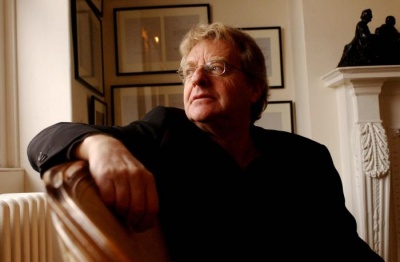Weaver's Week 2023-04-30
Last week | Weaver's Week Index | Next week
"I am one of the luckiest people on this earth."
Later, obituaries for Len Goodman and Jerry Springer. But first, a success for the living.
Contents |
Mastermind
Hindsight / Hat Trick for BBC2, 24 April
Thirty weeks of heats and semi-finals are done. All of the players here tonight have won, and they have won again. Some might be regarded as favourites for the title, some could be happy that they're making another trip to Belfast.
Each will take another trip, a mere eight steps to the famous black chair.
By tradition, each of the finalists makes a short film about their subject, their life, their family, and anything else they want to show off. At one point, these short films went out in a special programme just before the final. These days, the packages are shown during the final.
Ben Spicer, a bar manager from Bridgnorth, takes British and Irish Lions tours of the 21st century. He's always been a rugby fan, it's the biggest sport in Bridgnorth. Ben's mother has been helping with the revision, and thinks she could go on Mastermind. Mr. Spicer disagrees; we think Mrs. Spicer should apply, there are never enough older women on this show, and they're always good to watch. Alun Wyn Jones, the captain of the 2021 team, gives a good luck video message. Six tours form the basis of this round, about 50 matches and 200 players. The round starts strongly, but some of the final questions prove that bit too hard. At the end of two minutes, the score is 10 points (and one pass).
James Beeby, a charity director, will tell us about Princess Margaret. James "isn't the usual quizzer", but he has an amazing memory and recalls all sort of facts. The round is about Margaret Rose Windsor, the younger sister of the late Elizabeth Windsor. Deemed as "beautiful" in her young days, Princess Margaret was "despicable" when she almost married a divorcee, and reassessed following her death in February 2002. Anne Glenconner, a friend of Margaret, chats to James. Trips to film sets, a difficult marriage, the London Lighthouse centre, and the fact she was almost called Princess Anne. All this is grist to James' mill: he finishes on a PERFECT ROUND of 14 points.
Michael McPartland, a civil servant from Middlesbrough, is going to answer on the Rocky films. The series tells the story of an underdog who came from nothing, won his battles, and conquered the world. Michael's making his third appearance on the show, after reaching the final in 2014. We hear from Michael's family about how he's completely unbeatable in any board games. Even when he's playing Snakes and Ladders? No celebrity cameo, just lots of questions about the plots of the films. And, for a change, some good questions about the films' shooting and critical reception. The round starts strongly, sags in the middle, recovers to finish on 9 marks.
Stephen Finn, a retired lawyer from Herefordshire, takes Bletchley Park during World War II, the centre of the codebreaking effort. Stephen's only taken up quizzing now that he's retired, and has had tremendous amounts of help from his wife Sonny. Of course we're going to take a trip to the manor house, and a chat with the official historian Dr David Kenyon. How many people worked there? Over nine thousand! One of them was Betty Webb, who sends a good luck message. The input from SIS, bombe machines, the Enigma creations (one of which later turned up in Jeremy Paxman's office – more on that next month), and so much more. 12 points.
James Davidson, a commercial insight executive from Aberdeen, takes Augustus Caesar. The young man enjoys shouting answers at the telly, but this is the first serious quiz show he's appeared on – or even the first frivolous one. Augustus was the first Emperor of Rome, and founded many of the traditions and infrastructure still in use. He talks to Neil Curtis from the University of Aberdeen library, who has a coin from Augustus's reign. Must have fallen out of Nicholas Parsons' pocket. Never great for the nerves to get the first question wrong, but James recovers well to finish on 9 points.
Stuart Field, an administrator from Sheffield, answers on Extras, the BBC sitcom of the mid-aughts. He's ridden his luck to get here, a tie-break in the heats, a win on pass countback in the semi-final. Stuart's inspiration is Fred Housego, the taxi-driver who won Mastermind in 1980; Fred gives a good luck message, with his own winners' glass bowl. Extras was written by Ricky Gervais and Stephen Merchant; comedy, emotion, pathos and bathos all at the same time. Like all the contenders, Stuart has written a zillion flash cards, little nuggets to remember. Ricky Gervais, also a good luck message. By starting another question right on the buzzer, it's another PERFECT ROUND, 15 points.
Those were the specialist rounds. Each contender now returns to the chair for 2½ minutes of general knowledge questions. Ties are broken by fewest passes; they have a five-question playoff if there's still no clear winner.
Michael McPartland is first back, and gives the answers as briskly and crisply as he can. He remembers Edward Canning, the prime minister in office for such a brief time that potatoes didn't sprout; the artist of Vitruvian Man; and the inaugural Prince of Wales. His final score is 24 points, which may be enough to let him apply once more.
James Davidson also has ground to make up on the leaders. He knows about chemistry's moles, The Good the Bad and the Ugly, the new host of Blankety Blank, and the value of a farthing. Final score is 22 points; making the final is a tremendous achievement.
Ben Spicer dressed up in a Peaky Blinders cap, and a loud musical shirt; for the final, he's in a sober suit. The cast of Grange Hill, the process of moulting, and well-known flautist Lizzo all add to his score. 22 points, that one pass from earlier counts against him.
Stephen Finn is three off the lead, and knows about the Aylesbury duck – not Nicholas Parsons' cricket score, but a waterfowl. He soon falls into the dip of errors, which leads into a short pass spiral – questions he knows, but can't recall. Bamber Gascoigne offers a lifeline, but the answers don't quite come. 20 points and 3 passes.
James Beeby is one off the lead. House in the Bengal style? That's a bungalow. Number of The Beast? Channel 3 at 1700. Chicken chasseur, the sculpture on the Old Bailey, but the last right answers just won't quite come. Finally, Lisa Snowdon's win on Celebrity Masterchef gives the lead – 25 points.
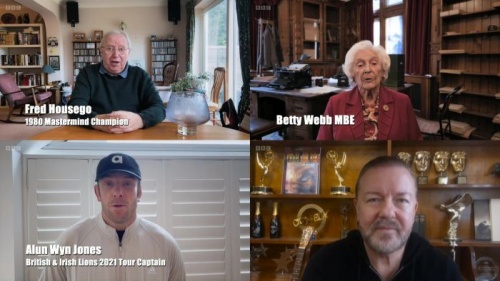 Good wishes are offered by Fred Housego (Mastermind legend), Betty Webb (from Bletchley Park), Alun Wyn Jones (rugby captain), and Ricky Gervais.
Good wishes are offered by Fred Housego (Mastermind legend), Betty Webb (from Bletchley Park), Alun Wyn Jones (rugby captain), and Ricky Gervais.
Stuart Field needs eleven to win, ten and no passes for another playoff. Wives of Henry VIII, PE at school, the Prado museum. Remember Dev Patel in Skins? Stuart does. A façade, Norwegian athletes at the winter sports spectacle, the gnu, Satanic mills. The answers just keep coming. Panhandle states! Saturday Night Fever. And then Stuart bursts through the finishing tape with the European Central Bank in Frankfurt, with time still to run up the score. Stuart's final score is 28 points.
"Absolutely incredible!" says Clive. "Well done", a standing ovation and handshakes from the assembled brains. "It's the best day of my life, thousands of hours of work pay off," from a visibly-moved Stuart.
Len Goodman
We're sorry to report the death of Len Goodman, the Strictly Come Dancing head judge until 2016. He was SEVEN!ty-eight.
Leonard Gordon Goodman was born on 25 April 1944 at Farnborough, Kent. The family – mother Louisa, father also called Len – lived in Bethnal Green at the time, but moved when Len was six to the suburb of Blackfen, near Sidcup. He spent his early childhood helping his grandfather, Albert, to drag fruit and vegetables from Spitalfields market to his stall in Bethnal Green. His father changed trades; an electrician during the war, now Goodman senior ran a greengrocer's shop.
Len left Westwood Secondary Modern in 1959. He worked as a fitter at ITC in Dartford, learning to make tools used to build their early computers. Len soon retrained as a welder at BOC in Cricklewood, which led to a job at Harland & Wolff's shipyard in North Woolwich.
By this time he had already started dancing lessons at the Court School of Dancing in Welling, with the aim of meeting some pretty girls. After watching a demonstration of professional ballroom dancing in Erith, Len was persuaded to join a beginners' class. He met Bill and Bobbie Irving, world ballroom dance champions, when they visited his studio.
And Len broke a bone in his foot while playing football, shattering his dream of playing for West Ham. He was advised to keep dancing as a way to aid his recovery: "I looked like a man trying to dance with one leg in the gutter and the other on the pavement. As my foot got better, I began to find I actually quite liked it." Len practised in his front room with a lamp behind him, so he could see his hip action from the shadows.
For dance purposes, Len was paired with Cherry Kingston, the studio owner's daughter. The pair were quality dancers, they won their first dance competition at Pontins holiday camp in Camber Sands. It took them to the national final at the Royal Albert Hall, where Fred Pontin presented the couple with their prize. When Cherry's father and studio owner Henry Kingston died suddenly, his widow urged Goodman to turn professional and help her run the dance studio. Goodman recalled how he had become "Britain's first ex-dock worker-cum-welder dance teacher".
Len and Cherry were Kent professional champions (1969), British Professional Rising Stars (1972) and won the Duel of the Giants (1973 and 1975). But Len knew his limits, and didn't push his competitive career any further. Instead, Len opened his own dance centre in Dartford in 1973, and gave demonstrations on the holiday camp round – there, Len learned how to please a crowd with fun banter. This column may have seen Len at Pontin's Pakefield camp in Suffolk during summer 1983; if we did, we remember nothing of the demonstration.
Len and Cherry married, but divorced in 1987. And there we might have expected Len Goodman's career to end. A life doing the thing he loves, and the thing he's good at – teaching and demonstrating dance.
Then came a day in early 2004. The dance grapevine was abuzz that the BBC was struggling to complete the line-up of four judges for Strictly Come Dancing, only three of whom had been chosen. After being tipped off by professional dancer Erin Boag, Len Goodman turned up to his audition in a country gent's outfit, all tweed suit and a pair of two-tone shoes bought in Jermyn Street. He was an instant hit, offering precise criticism, constructive criticism, and lifting the couple with fair criticism. Len was astonished to be offered the chairmanship of the panel, alongside Arlene Phillips, Bruno Tonioli, and Craig Revel Horwood.
Strictly Come Dancing was an instant hit. Len was the wise old sage of the panel, even though he was a spring chicken compared to host Bruce Forsyth. Len was fulsome in his praise, with memorable lines like "That was a mango of a tango! Delicious!" or "You floated across the floor like butter on a crumpet." He made a catchphrase out of a good mark, declaiming "Se-VEN!"; the best work was rewarded with "a Ten from Len!"
Len was honest with his thoughts, and kept no sacred cows. Professional dancer James Jordan complained when the judges criticised his routine with his celebrity partner Alex Jones. "The public liked it!" said James. Len insisted the panel knew otherwise: "We spend a lifetime watching, teaching and judging dancing. Our criteria are different to the public."
Len Goodman still shared the joy of dance. He knew when to offer gentle encouragement and when to pull someone up; Len was always someone of integrity. In 2006, he said “I'm so glad I did it because it's dispelled the preconception about what dance classes or schools are like. The programme has changed things in dancing schools like you can't imagine. Everyone has had huge influxes of people coming to dance. It's absolutely brilliant."
Len was given the Carl Alan award in recognition of his outstanding contribution to dance. Not that he performed very much – he said he'd not danced himself outside of a wedding since 1973. "If I get up to dance and have a shuffle people will say 'Oh, he's not very good. But then if I do it properly, they will say I'm showing off."
He also worked on ABC (Disney)'s show Dancing With the Stars, commuting across the Atlantic every week during the autumn seasons. Nothing could stop Len – not while being treated for prostate cancer in 2009, not after his knee replacement operation during 2015.
Len retired from Strictly in 2016, and continued working on Dancing With the Stars until last autumn. The BBC gave him the three-part documentary Titanic with Len Goodman (2012), Goodman's Dance Band Days, Len Goodman's Perfect Christmas and Dancing Cheek to Cheek (all 2013), and a series of music shows on Radio 2. And there was Partners in Rhyme (2017), identify a celebrity doing something strange to something.
So what that Partners in Rhyme wasn't a show for this column. Not every show has to be precisely to our taste. There were seven-year-olds across the country, shouting the answers at the telly, laughing like a hyena, and enjoying the time like no other. There were doting grannies who encourage their grandchildren to do exactly this. There were primary school teachers who could have used Partners in Rhyme as a teaching aid, something to introduce rhyme into their lessons. Maybe some of them still do.
Like everything Len Goodman did, it was fun, it was wholesome, and it made life better. He leaves one child, James, the son from his long-standing relationship with Lesley Pine, a teacher at Goodman’s dance school. Len is survived by his second wife Sue, a dance teacher who he married in 2012.
Jerry Springer
Another Londoner made good has died. Jerry Springer was born in Highgate tube station during a bombing raid. His parents, Margot and Richard, were refugees from the holocaust and moved to the States at the age of five. Springer was a lawyer, a political operative for Robert F. Kennedy and a member of Cincinnati city council, all by the age of 27. He lost his council seat after being convicted of soliciting a prostitute, but then regained it in the next election and went on to become the city's appointed mayor.
After leaving elected office, he moved to television. Jerry Springer became Cincy's most popular anchorman, winning multiple Emmy awards for his short commentaries. Eventually, Springer would host a series of Got Talent for NBC, and fronted our Channel 5's short-lived backstabbing big money quiz Gr££d.
To get these big gigs, Jerry Springer rose to international fame through his eponymous television talk show, which lasted from 1991 to 2018. The show featured emotional catharsis, shouting, men who married their horses, unexpected revelations, shouting, thrown chairs, and a bit more shouting.
Springer tapped into the concerns of working-class America. The Jerry Springer Show defied all the traditions of American telly: the people on it don't speak the king's English, they're not rich or powerful, and most of them don't have an education. His television talk show was democratic television for the demos, it showed the people of America to the people of America – the good, the bad, and the ugly.
Was he a welcome alternative to Oprah's cloying sentimentality? Yes. After being manipulated into a cartoon outrage, was Springer's show an honest reflection of anything? No. Did he have to be so cruel? No, and the cruelty is what he will be remembered for.
Springer's influence spread directly to ITV, where The Jeremy Kyle Show adopted the same techniques, albeit with an even less sympathetic host. We could argue that the fad for cruel game shows in the early 2000s owed inspiration to Springer: would Big Brother and its infamous fight night have happened without him? Did The Weakest Link take permission on how acceptable it was to be shockingly nasty to contestants? Springer had the intellectual courage to reflect on how he had tainted television, and make some gesture of apology.
A statement from the Springer family said, "Jerry's ability to connect with people was at the heart of his success in everything he tried, whether that was politics, broadcasting or just joking with people on the street who wanted a photo or a word. He's irreplaceable and his loss hurts immensely, but memories of his intellect, heart and humour will live on." Jerry Springer is survived by an ex-wife, a daughter, and an opera. Jerry Springer was 79.
In other news
Colin Pigott has also died. You won't know the face, you might recognise the name from credits, you'll certainly recognise his work. Colin was the production designer or set designer for many great shows – Argumental, Big Brother, Beauty and the Geek, Distraction, Rising Damp, So Graham Norton, They Think It's All Over, and the breathtaking set for Parallel 9.
Congratulations to the Strictly Come Dancing team, winners of the Entertainment Craft collective gong at last Sunday's BAFTA Craft Awards.
Take two hosts into the shower? Big Brother plans to, with AJ Odudu and Will Best sharing host's duties. Weekly evictions, and a live nightly show, will be hosted by the dynamic duo. Big Brother arrives on ITV2 later in the year.
University Challenge is the last remaining part of Quizzy Mondays on the telly. Durham booked their place in the semi-final, defeating UCL by 160-145. Durham trailed for most of the game, and looked out of it when 55 adrift with seven minutes to play. But buzzer quizzes can change quickly, with a couple of incorrect interruptions from the London side, and Durham's Bea Bennett answering this quite remarkable starter:
Q: If "Northanger Abbey" is gold and "Anne Of Green Gables" is molybdenum, what element is "Lolita" in the context of each author's surname?
A: Sodium.
The surnames are Austen, Montgomery, and Nabokov; first two letters give the chemical elements. Earlier, UCL had impressed with knowledge of languages that don't have any official status, and of quantum computing. But it was Durham's late skill on milliamps-per-hour and VEL-words to prove the difference.
No University Challenge next week, it's on a long rest because of the snooker. The last match in the group phase goes out on 8 May, with the final scheduled for 29 May. There's very little in the way of new thrills next week, what with everyone gearing up for a once-in-a-generation event. We'll be back in seven days with a look at In With a Shout.
Pictures: Hindsight / Hat Trick, BBC, Objective Media Group / Panda Television, @lindseystirling@instagram.com
To have Weaver's Week emailed to you on publication day, receive our exclusive TV roundup of the game shows in the week ahead, and chat to other ukgameshows.com readers, sign up to our Google Group.


